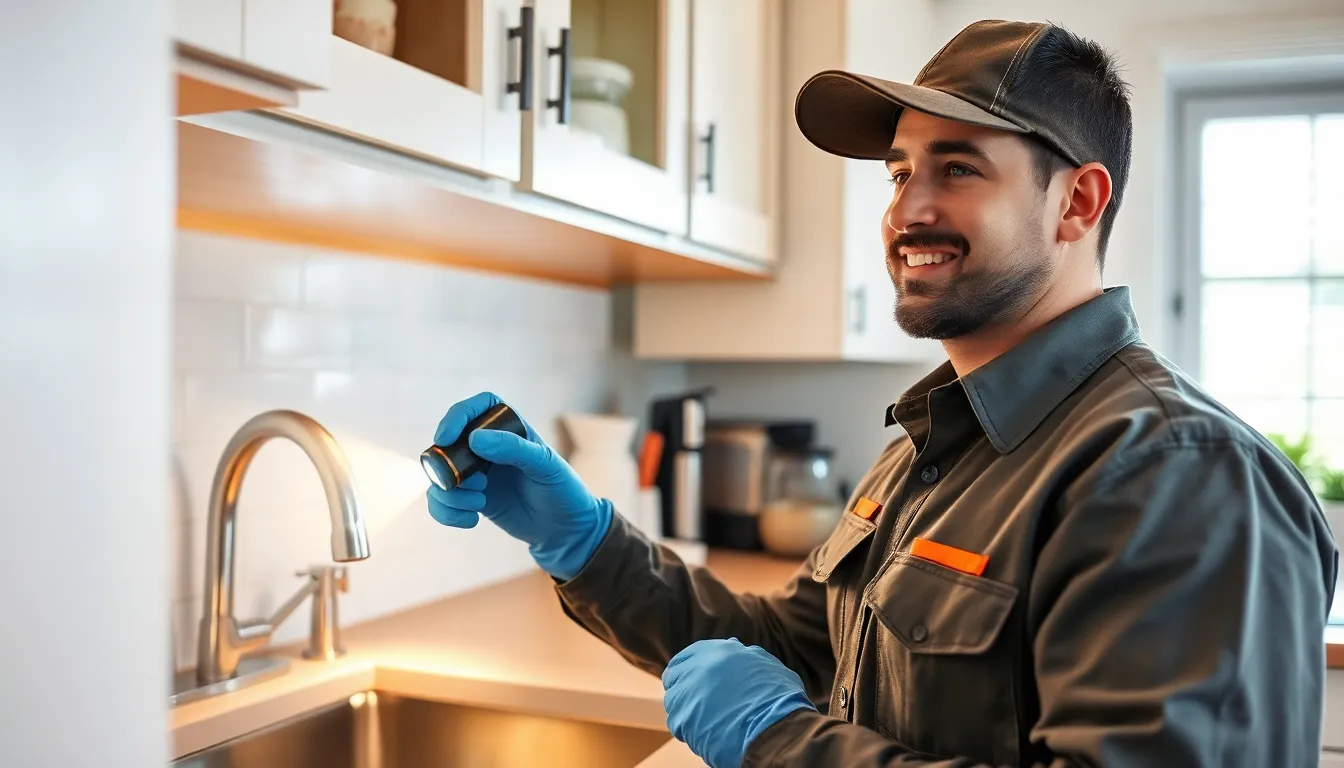Every homeowner knows the sinking feeling of spotting an uninvited guest scuttling across the floor. Whether it’s a cockroach auditioning for a horror film or a family of ants planning a takeover, pests can turn a cozy home into a chaotic battleground. Residential pest control isn’t just about squashing bugs; it’s about reclaiming your space and restoring peace of mind.
Table of Contents
ToggleUnderstanding Residential Pest Control
Residential pest control involves a range of strategies to manage and eliminate pest infestations from homes. Effective pest control ensures a safe living environment while preventing potential damage and health risks associated with unwanted pests.
What Is Residential Pest Control?
Residential pest control refers to techniques used to identify, prevent, and eliminate pests in homes. This process includes inspections, treatments, and ongoing monitoring for common pests like ants, rodents, and termites. Various methods exist, including chemical, biological, and physical treatments. Each approach targets different pest behaviors and habitats. Homeowners often engage professionals for comprehensive solutions that address specific infestations effectively.
Importance of Residential Pest Control
Residential pest control is vital for maintaining health and safety in homes. Pests can carry diseases and cause allergic reactions, posing risks to family members. Effective pest management protects property from structural damage caused by insects like termites. It also preserves the overall quality of life by ensuring a comfortable living environment. Regular pest control services help identify potential issues before they escalate, reducing long-term costs associated with severe infestations. Professional assistance provides expertise in pest management, ensuring proactive measures that benefit homeowners.
Common Pests in Residential Areas

Understanding common residential pests helps homeowners take action against infestations. Different types of pests pose various threats to health and property.
Rodents
Rodents commonly invade homes seeking food and shelter. Mice and rats both cause significant damage, chewing through wires, insulation, and structural elements. They can carry diseases like hantavirus and leptospirosis, which lead to serious health issues. Signs of rodent presence include droppings, gnaw marks, and nests. Sealing entry points effectively prevents future infestations. Regular inspections and proactive measures maintain a rodent-free environment.
Insects
Insects can disrupt daily life in many ways. Ants, cockroaches, and termites are prevalent nuisances in residential areas. Ants often invade kitchens, drawn by food sources; common types include carpenter ants and odorous house ants. Cockroaches pose health risks, as they can trigger allergies and asthma. Termites, on the other hand, threaten property by compromising wooden structures. Homeowners should look for signs like droppings, shed wings, and damage to wood. Keeping spaces clean and utilizing professional pest control services contribute to effective insect management.
Methods of Pest Control
Various methods exist for effective pest control in residential settings. Each approach addresses specific pest behaviors and challenges.
Chemical Treatments
Chemical treatments include pesticides designed to eliminate pests on contact or through ingestion. These products can be applied directly to infected areas or used in bait formulations. Certain chemicals work fast, targeting insects like cockroaches and ants. When employing chemical treatments, safety precautions are crucial to protect residents and pets from exposure. Professionals often conduct applications to ensure efficacy and minimize risks.
Eco-Friendly Solutions
Eco-friendly solutions focus on minimizing environmental impact while effectively controlling pests. Natural pesticides derived from plants or essential oils provide safer alternatives to traditional chemicals. Examples include diatomaceous earth which targets crawling insects and neem oil that disrupts pest breeding. Implementing such methods not only addresses pest problems but also promotes a sustainable approach to pest management. Homeowners often find these solutions align with their desire for safer residential environments.
Preventive Measures
Preventive measures play a vital role in pest control strategies. Regular inspections help identify potential infestations before they escalate. Sealing entry points prevents pests from accessing interiors. Maintaining cleanliness, such as proper food storage and regular waste disposal, reduces attractants. Encouraging landscaping practices that deter pests further enhances prevention efforts. Adhering to these practices builds a strong defense against pest issues.
Choosing a Pest Control Service
Selecting a professional pest control service involves several crucial factors that can impact effectiveness and satisfaction.
Credentials to Look For
Verify the company’s licensing. A valid license ensures compliance with state regulations. Assess their certifications. Membership in organizations like the National Pest Management Association indicates a commitment to industry standards. Investigate their experience. Established companies often provide better insights into pest management strategies. Review customer feedback. Positive testimonials reflect reliability and quality service. Confirm insurance coverage. Proper insurance protects homeowners from liability in case of damages.
Questions to Ask
Inquire about treatment methods. Understanding the approach ensures it aligns with your preferences. Ask about the safety of products used. Knowing whether they are eco-friendly supports health and environmental concerns. Question the frequency of visits. Regular maintenance is important for effective pest management. Request a detailed inspection. A thorough assessment identifies specific pest issues in your home. Clarify the warranty or guarantee. Knowing the terms protects your investment and adds assurance.
Cost Considerations
Understanding the costs associated with residential pest control is essential for homeowners seeking effective solutions. Prices vary based on several aspects, making it crucial to gather specific information.
Average Pricing
Average pricing for residential pest control services typically ranges from $100 to $300 per treatment. For ongoing monthly services, homeowners can expect to pay between $30 and $50. Factors such as property size and pest type influence these rates. Initial inspections often incur additional costs, generally around $50 to $150. Some companies may offer bundled packages providing discounts for multiple treatments.
Factors Affecting Cost
Several factors impact the cost of pest control services. Property size plays a significant role; larger homes may require more extensive treatments. The type of pests involved also affects pricing; for instance, termite treatments generally cost more than general insect control. Treatment methods influence expenses as well; chemical applications often require different pricing structures compared to eco-friendly solutions. Seasonal demand can fluctuate prices; higher pest activity seasons may lead to increased rates. Lastly, company reputation and experience contribute to pricing, as established firms might charge premium rates for proven results.
Effective residential pest control is essential for maintaining a healthy and safe living environment. By employing a combination of preventive measures and professional services, homeowners can protect their properties from the damaging effects of pests. Understanding the various treatment options and their costs empowers individuals to make informed decisions that suit their needs. Regular inspections and proactive strategies not only help in early detection but also reduce long-term expenses associated with infestations. Ultimately, investing in pest control ensures peace of mind and contributes to a better quality of life.


